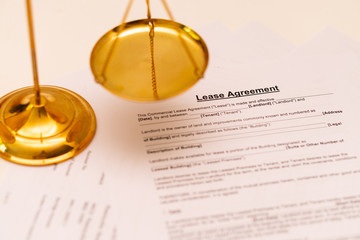
Real estate contracts are legal documents that outline the terms of a purchase transaction between a seller and buyer. Before signing a commercial real estate lease, it is important to understand the different types of leases and what they entail. Contact our real estate contracts lawyers for more information. Here are some common types of commercial leases:
– Triple Net (NNN): This type of commercial lease requires tenants to pay rent plus additional costs associated with operating and maintaining the building. These costs may include taxes, insurance, maintenance, and repairs. Tenants may also be responsible for utilities and other expenses related to their business operations on the property.
– Full Service: This type of lease includes all operating expenses as part of the rent payment. The landlord pays for taxes, insurance, repairs, and maintenance in addition to basic services such as cleaning or landscaping.
– Modified Gross Lease: This type of lease is a hybrid between the triple net and full-service leases. The tenant pays rent plus some additional costs, such as utilities or janitorial services.
– Percentage Lease: With this type of commercial lease, tenants pay a base rental rate plus a percentage of their total sales revenue generated from their business activities in the property.
It is also important to carefully read and review all terms and conditions of the lease before signing. Make sure that you understand all aspects of the real estate contracts before committing to any long-term obligations.
Be sure to ask questions to ensure that everything makes sense and there are no hidden fees or surprises later on down the road. Ultimately, understanding all aspects of your commercial real estate lease will save you a lot of time and money in the future.
The Key Stages Of A Commercial Real Estate Closing

Once all the paperwork is in order and the seller has accepted the buyer’s offer, it’s time to close on a property. The closing process for commercial real estate can be complex and lengthy, with numerous parties involved throughout the key stages.
The first step is due diligence, where both buyers and lenders review documents related to the property such as financial statements, leases, title reports, surveys, environmental reports, and appraisals. During this phase, buyers also inspect the property for any potential issues that could affect its value or function.
Next comes financing and title insurance. Buyers typically seek out a loan or other funding source to cover part of their purchase price; during this stage, they must also acquire an owner’s title insurance policy to protect against potential title issues.
Once financing is in place, the buyer and seller enter into a purchase agreement. This document specifies the terms of the sale, including any contingencies that must be met before closing can take place. It also outlines who pays for what fees are associated with the closing process.
The last step is closing on the property. At this stage, all parties involved sign off on all documents, exchange funds, and keys are handed over to the buyer. The deed of trust or mortgage note is then recorded at the appropriate county clerk’s office. Once this process is complete, ownership has officially transferred from seller to buyer – mission accomplished!
Florida Commercial Real Estate Closing Checklist

The following is an overview of the commercial real estate closing process in Florida:
- Obtaining a Closing Agent: It is important to find and hire a qualified closing agent who will be responsible for handling all details associated with the transaction and for ensuring that it meets all legal requirements. The closing agent should be familiar with local, state, and federal laws, as well as any special provisions related to the particular property being purchased or sold.
- Title Clearance and Search: The title clearance process involves searching public records to ensure that there are no liens, judgments, easements, or other encumbrances on the property that could complicate or prevent the completion of the sale. This search can take up to two weeks and may require the assistance of an attorney.
- Closing Documentation: The closing agent will prepare all documents necessary for the transaction, including mortgages, deeds of trust, title policies, leases, options to purchase, and any other contracts associated with the sale. These documents must be reviewed and approved by both parties before they can be signed.
- Financing: If applicable, financing details should be established before closing to ensure that sufficient funds are available to cover the purchase price at or before closing. The closing agent will provide information related to mortgage rates and terms as well as any special requirements from lenders regarding the transaction.
- Final Walkthrough: A final walkthrough should be conducted by both parties before closing to inspect the property and ensure that all agreed-upon repairs, renovations, or improvements have been made.
- Closing: The closing agent will coordinate with all parties involved to ensure that a successful closing occurs. This includes handling funds, processing paperwork, and completing the transfer of ownership rights. After this process is complete, the sale is officially completed and finalized.
- Delivery of Documents and Funds: Upon completion of the closing process, all documents related to the transaction should be provided to both parties as well as any necessary lenders or title companies for review purposes. Additionally, any funds due must be delivered at this time by state laws and regulations.
By following this checklist, buyers and sellers of commercial real estate in Florida can help make sure their transaction proceeds as smoothly as possible. They should always seek advice from an experienced professional when necessary, such as our attorneys who can guide the best course of action for any given situation. With proper planning and preparation, most parties involved should be able to complete their commercial real estate transactions without difficulty.
Our commercial real estate contracts attorney team provides experienced legal counsel and representation to businesses large and small in all aspects of commercial real estate transactions. Our attorneys help maximize the value of every transaction by working with clients on title opinions, purchase agreements, zoning regulations, loan documents, leases, and financing arrangements.
We have a deep understanding of the complexities involved in real estate contracts, including tax considerations that can make or break a deal. Our commitment to our clients is to provide comprehensive advice and counsel tailored to their individual goals. Whether you are buying or selling property, building a new business, or expanding an existing one, we will ensure that your interests are protected throughout the entire process. With decades of experience at our disposal, our Commercial Real Estate Attorney team stands ready to work with you and deliver the results you need. Contact us today at (561) 770-3335 to discuss your specific commercial real estate situation and see what we can do for you.






